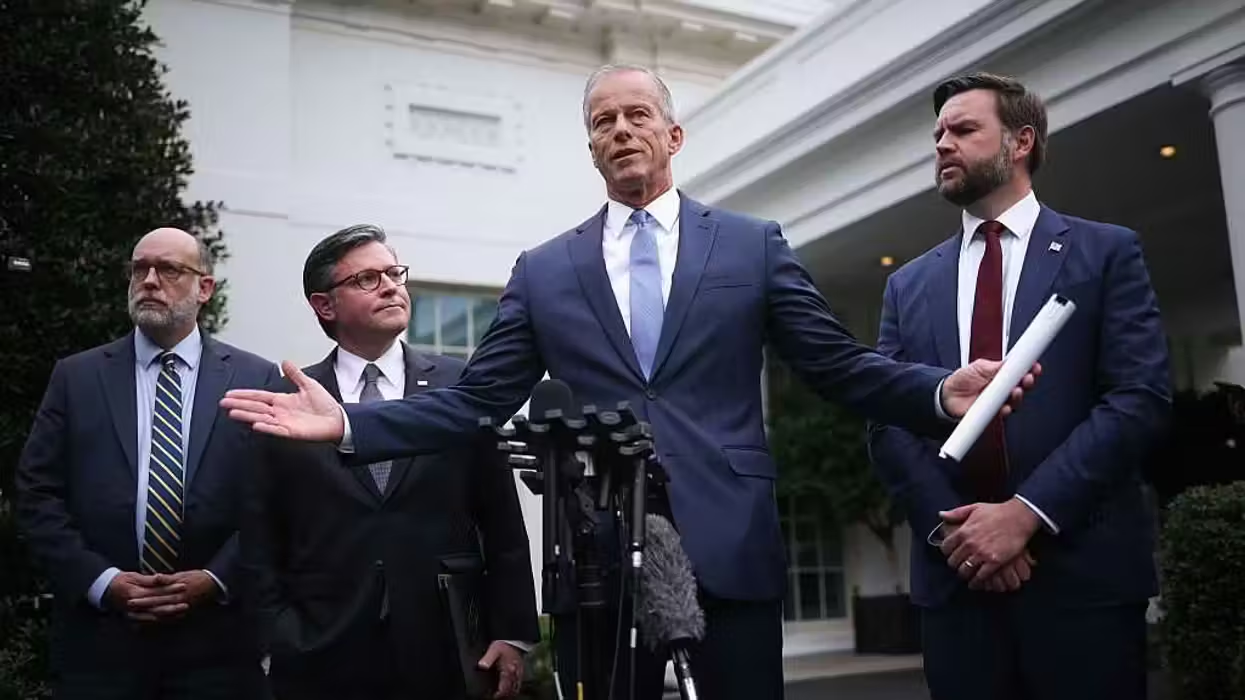
© 2025 Blaze Media LLC. All rights reserved.
Two Top-Ranking U.S. Military Officials Dismissed in the Same Week (And They Have Something in Common)
October 12, 2013
The U.S. Air Force on Friday fired Maj. Gen. Michael Carey, the man tasked with overseeing its nuclear missiles.
 This undated handout photo provided by the U.S. Air Force shows Maj. Gen. Michael J. Carey (AP Photo/U.S. Air Force)
This undated handout photo provided by the U.S. Air Force shows Maj. Gen. Michael J. Carey (AP Photo/U.S. Air Force)
Oddly enough, two days before Carey’s firing, the Navy sacked Vice Adm. Tim Giardina, the second-in-command at U.S. Strategic Command, which writes the military's nuclear war plans and would transmit launch orders should the nation ever go to nuclear war.
Giardina was relieved of command amid allegations he used counterfeit poker chips at a casino. He was demoted from three- to two-star rank and reassigned to a Navy staff job until the Naval Criminal Investigative Service probe is completed.
The Air Force would not specify what Carey did to get fired, but two officials with knowledge of the investigation indicated that it was linked to alcohol use.
The 35-year veteran, who took command of the ICBM force, at 20th Air Force headquarters at F.E. Warren Air Force Base, Wyo., in June 2012, will be reassigned pending the outcome of an investigation into personal misbehavior, the service said.
Carey’s case appears to be unrelated to that of Giardina, but the two men are associated in the chain of responsibility for U.S. nuclear weapons.
Carey did not report directly to Giardina, but the ICBMs under Carey's command would, in the event of war, receive their launch commands through Strategic Command, where Giardina had been the deputy commander since December 2011.
The decision to sack Carey, a veteran of the wars in Iraq and Afghanistan, was made by Lt. Gen. James Kowalski, commander of Air Force Global Strike Command, which is in charge of all Air Force nuclear weapons, including bombers.
Kowalski selected the vice commander of Air Force Global Strike Command, Maj. Gen. Jack Weinstein, to temporarily replace Carey.
By coincidence, Kowalski, who fired Carey, has been nominated to succeed Giardina at Strategic Command. The Senate has not yet confirmed Kowalski.
"It's unfortunate that I've had to relieve an officer who's had an otherwise distinctive career spanning 35 years of commendable service," Kowalski said in a written statement from his headquarters at Barksdale Air Force Base, La.
An internal email obtained by the AP on Friday said the allegations against Carey stem from an inspector general probe of his behavior while on an unspecified "temporary duty assignment." The email said the allegations are not related to the operational readiness of the ICBM force or recent failed inspections of ICBM units.
At a Pentagon news conference, an Air Force spokesman, Brig. Gen. Les Kodlick, would not provide details about the alleged misbehavior by Carey except to say it does not involve sexual misconduct, drug use, adultery or criminal activity.
Later the Air Force said the investigation should be finished in three to six weeks.
"There was misbehavior such that (Kowalski) decided that it didn't exemplify the trust and responsibilities required of a commander who is responsible for the nuclear force," Kodlick said.
Together the missteps spell trouble for a nuclear force doubted by some for its relevance, defended by others as vital to national security and now compelled to explain how the firing of key commanders this week should not shake public confidence.
 UNSPECIFIED - UNDATED - In this handout photo acquired from the U.S. Navy on October 10, 2013, deputy commander of U.S. nuclear forces, Vice Adm. Tim Giardina poses for a portrait (Getty Images)
UNSPECIFIED - UNDATED - In this handout photo acquired from the U.S. Navy on October 10, 2013, deputy commander of U.S. nuclear forces, Vice Adm. Tim Giardina poses for a portrait (Getty Images)
In an Associated Press interview Friday, the nation's most senior nuclear commander, Air Force Gen. Robert Kehler, said he told his bosses, Defense Secretary Chuck Hagel and the Joint Chiefs chairman, Army Gen. Martin Dempsey, that despite the two "unfortunate behavioral incidents," the nuclear force is stable.
"I still have 100 percent confidence that the nation's nuclear deterrent force is safe, secure and effective," Kehler said from his Strategic Command headquarters in Nebraska.
Together, the Carey and Giardina dismissals add a new dimension to a set of serious problems facing the military's nuclear force.
The ICBM segment in particular has had several recent setbacks, including a failed safety and security inspection at a base in Montana in August, followed by the firing of the colonel there in charge of security forces. In May, The Associated Press revealed that 17 Minuteman 3 missile launch control officers at Minot Air Force Base, N.D., had been taken off duty in a reflection of what one officer there called "rot" inside the ICBM force.
 This undated handout photo provided by the US Air Force shows Lt. Gen. James M. Kowalski (Credit: AP)
This undated handout photo provided by the US Air Force shows Lt. Gen. James M. Kowalski (Credit: AP)
In an inspection that the Air Force publicly termed a "success," the AP disclosed that launch crews at Minot scored the equivalent of a "D" grade on missile operations. In June the officer in charge of training and proficiency of Minot's missile crews was fired.
The sidelined launch officers were "not taking the job seriously enough," causing their bosses to worry that they failed to understand what it takes to "stay up to speed" on nuclear missile operations, the Air Force chief of staff, Gen. Mark Welsh, told Congress in May. What it boiled down to, he said, was a lack of "proper attitude."
The U.S. has been shrinking the size of its nuclear arsenal for many years; it is comprised of long-range missiles aboard submarines, long-range bombers and ICBMs. As of Oct. 1 the U.S. had 1,688 deployed strategic nuclear warheads, which Washington is obliged to reduce to 1,550 by 2018 under the New START treaty with Russia.
As the arsenal has grown smaller, questions about management of the force have loomed larger. Rep. Howard "Buck" McKeon, the Republican chairman of the House Armed Services Committee, said in August that the Air Force must refocus on its nuclear mission.
He urged it to "hold failed leadership" accountable and to "recommit itself from the top down" to the mission of safely operating nuclear weapons.
--
Follow Becket Adams (@BecketAdams) on Twitter
The Associated Press contributed to this story.
[related]
Want to leave a tip?
We answer to you. Help keep our content free of advertisers and big tech censorship by leaving a tip today.
Want to join the conversation?
Already a subscriber?
more stories
Sign up for the Blaze newsletter
By signing up, you agree to our Privacy Policy and Terms of Use, and agree to receive content that may sometimes include advertisements. You may opt out at any time.
Related Content
© 2025 Blaze Media LLC. All rights reserved.
Get the stories that matter most delivered directly to your inbox.
By signing up, you agree to our Privacy Policy and Terms of Use, and agree to receive content that may sometimes include advertisements. You may opt out at any time.






